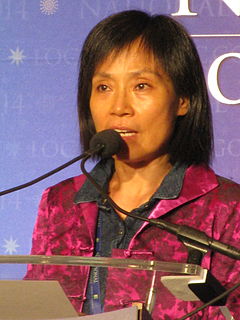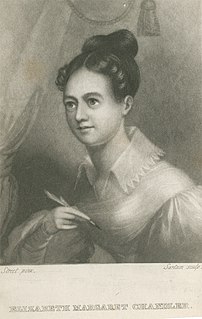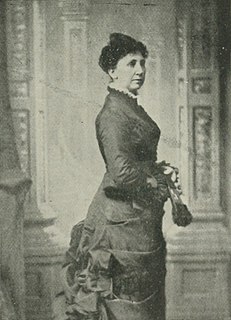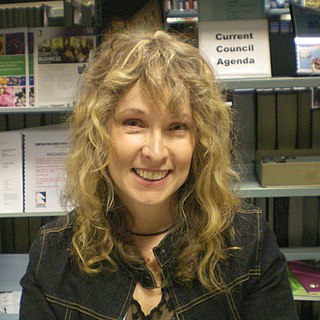A Quote by Flannery O'Connor
Behind the newspaper Julian was withdrawing into the inner compartment of his mind where he spent most of his time. This was a kind of mental bubble in which he established himself when he could not bear to be a part of what was going on around him. From it he could see out and judge but in it he was safe from any kind of penetration from without. It was the only place where he felt free of the general idiocy of his fellows. His mother had never entered it but from it he could see her with absolute clarity.
Related Quotes
Slowly his resistance ebbed. She felt the change in his body, the relaxing of tension, his shoulders curving around her as if he could draw her into himself. Murmuring her name, he brought her hand to his face and nuzzled ardently into her palm, his lips brushing the warm circlet of her gold wedding band. “My love is upon you,” he whispered…and she knew then that she had won.
Westley closed his eyes. There was pain coming and he had to be ready for it. He had to prepare his brain, he had to get his mind controlled and safe from their efforts, so that they could not break him. He would not let them break him. He would hold together against anything and all. If only they gave him sufficient time to make ready, he knew he could defeat pain. It turned out they gave him sufficient time (it was months before the Machine was ready). But they broke him anyway.
Human beings look separate because you see them walking about separately. But then we are so made that we can see only the present moment. If we could see the past, then of course it would look different. For there was a time when every man was part of his mother, and (earlier still) part of his father as well, and when they were part of his grandparents. If you could see humanity spread out in time, as God sees it, it would look like one single growing thing--rather like a very complicated tree. Every individual would appear connected with every other.
Todd's mother had several children by different fathers, and Todd [Willingham] had been abandoned in California. ... He's a good-looking man. He was a witty man, you know? Funny, caring. He wasn't arrogant, but he was kind of set in his ways. If he thought something, it was one way. You could show him an alternative, but he was still going to stick by his particular view. But I could see how to women he could be a very charming, good-looking guy, especially when he was younger.
He looked at her as a man looks at a faded flower he has gathered, with difficulty recognizing in it the beauty for which he picked and ruined it. And in spite of this he felt that then, when his love was stronger, he could, if he had greatly wished it, have torn that love out of his heart; but now when as at that moment it seemed to him he felt no love for her, he knew that what bound him to her could not be broken.
He had no memory of ever being hugged like this, as though by a mother. The full weight of everything he had seen that night seemed to fall in upon him as Mrs. Weasley held him to her. His mother's face, his father's voice, the sight of Cedric, dead on the ground all started spinning in his head until he could hardly bear it, until he was screwing up his face against the howl of misery fighting to get out of him.
If he looked into her face, he would see those haunted, loving eyes. The hauntedness would irritate him - the love would move him to fury. How dare she love him? Hadn't she any sense at all? What was he supposed to do about that? Return it? How? What could his calloused hands produce to make her smile? What of his knowledge of the world and of life could be useful to her? What could his heavy arms and befuddled brain accomplish that would earn him his own respect, that would in turn allow him to accept her love?
He was about to go home, about to return to the place where he had had a family. It was in Godric’s Hollow that, but for Voldemort, he would have grown up and spent every school holiday. He could have invited friends to his house. . . . He might even have had brothers and sisters. . . . It would have been his mother who had made his seventeenth birthday cake. The life he had lost had hardly ever seemed so real to him as at this moment, when he knew he was about to see the place where it had been taken from him.
I had utterly abandoned myself to Him. Could any choice be as wonderful as His will? Could any place be safer than the center of His will? Did not He assure me by His very presence that His thoughts toward us are good, and not evil? Death to my own plans and desires was almost deliriously delightful. Everything was laid at His nail-scarred feet, life or death, health or illness, appreciation by others or misunderstanding, success or failure as measured by human standards. Only He himself mattered.
Today the manliest man would be ashamed to look into the eyes of the woman by his side and tell her that he is the master because he could knock her down with perfect ease, and break her bones with much greater facility than she could his. And yet, out of man's brute nature, out of that most ignoble in himself, has come his loudest assumption of superiority, his longest and lowest tyranny.
As time passed and he grew to know people better, he began to think of himself as an extraordinary man, one set apart from his fellows. He wanted terribly to make his life a thing of great importance, and as he looked about at his fellow men and saw how like clods they lived it seemed to him that he could not bear to become also such a clod.
she was aware of his love - how could she not? She perceived it every time he looked at her. He was not demonstrative, but his ardour was all the more evident for the reins with which he restrained it, the mask of steel behind which he imprisoned it, his detached demeanour and deliberate gestures that, far from parading a lack of interest, displayed the strength of his self-discipline, that he could so tightly curb the intensity of his passion.
He could hardly imagine anymore what his life would be without the weight of his hidden knowledge. He'd come to think of it as a kind of penance. It was self-destructive, he could see that, but that was the way things were. People smoked, they jumped out of airplanes, they drank too much and got into their cars and drove without seat belts.
How could he convey to someone who'd never even met her the way she always smelled like rain, or how his stomach knotted up every time he saw her shake loose her hair from its braid? How could he describe how it felt when she finished his sentences, turnec the mug they were sharing so that her mouth landed where his had been? How did he explain the way they could be in a locker room, or underwater, or in the piney woods of Maine, bus as long as Em was with him, he was at home?






































